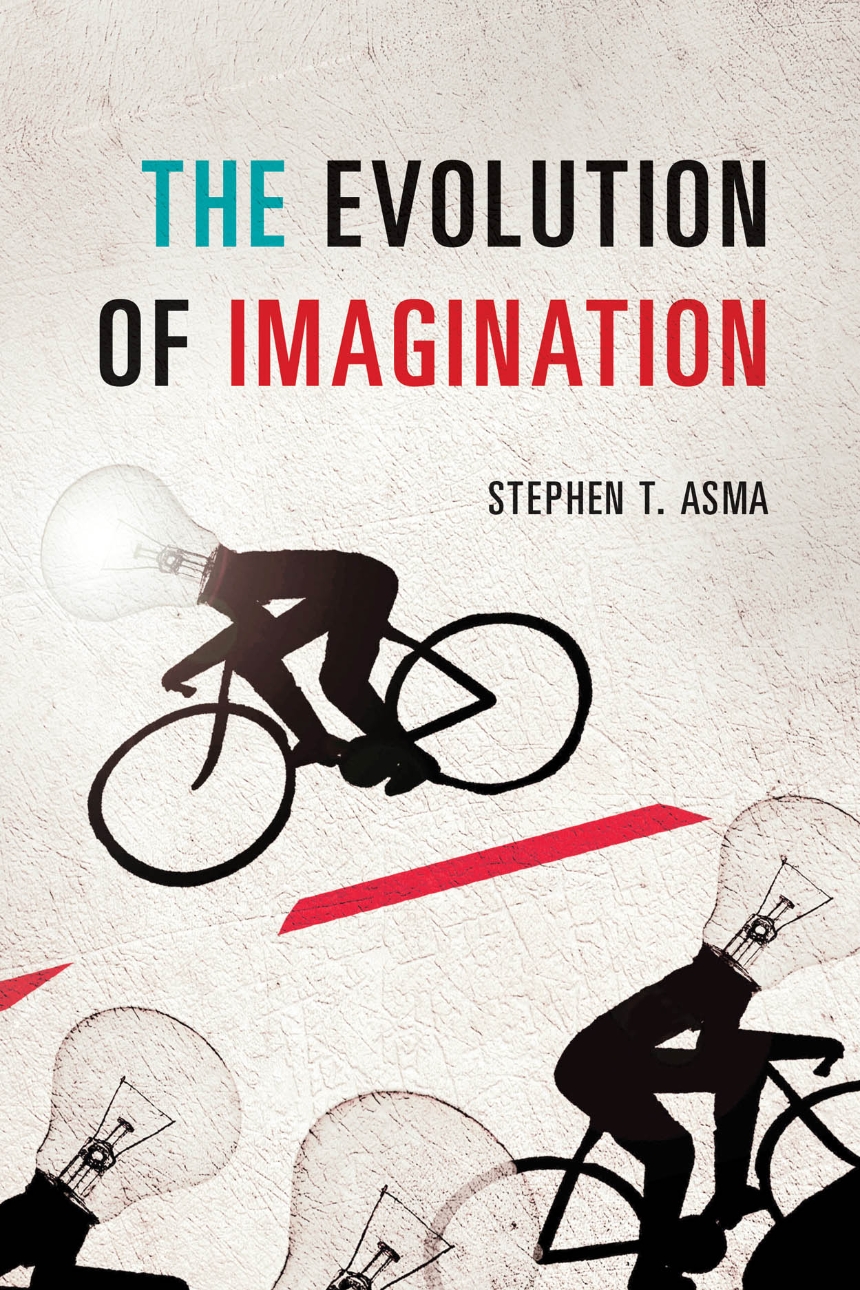The Evolution of Imagination
Consider Miles Davis, horn held high, sculpting a powerful musical statement full of tonal patterns, inside jokes, and thrilling climactic phrases—all on the fly. Or think of a comedy troupe riffing on a couple of cues from the audience until the whole room is erupting with laughter. Or maybe it’s a team of software engineers brainstorming their way to the next Google, or the Einsteins of the world code-cracking the mysteries of nature. Maybe it’s simply a child playing with her toys. What do all of these activities share? With wisdom, humor, and joy, philosopher Stephen T. Asma answers that question in this book: imagination. And from there he takes us on an extraordinary tour of the human creative spirit.
Guided by neuroscience, animal behavior, evolution, philosophy, and psychology, Asma burrows deep into the human psyche to look right at the enigmatic but powerful engine that is our improvisational creativity—the source, he argues, of our remarkable imaginational capacity. How is it, he asks, that a story can evoke a whole world inside of us? How are we able to rehearse a skill, a speech, or even an entire scenario simply by thinking about it? How does creativity go beyond experience and help us make something completely new? And how does our moral imagination help us sculpt a better society? As he shows, we live in a world that is only partly happening in reality. Huge swaths of our cognitive experiences are made up by “what-ifs,” “almosts,” and “maybes,” an imagined terrain that churns out one of the most overlooked but necessary resources for our flourishing: possibilities. Considering everything from how imagination works in our physical bodies to the ways we make images, from the mechanics of language and our ability to tell stories to the creative composition of self-consciousness, Asma expands our personal and day-to-day forms of imagination into a grand scale: as one of the decisive evolutionary forces that has guided human development from the Paleolithic era to today. The result is an inspiring look at the rich relationships among improvisation, imagination, and culture, and a privileged glimpse into the unique nature of our evolved minds.
Guided by neuroscience, animal behavior, evolution, philosophy, and psychology, Asma burrows deep into the human psyche to look right at the enigmatic but powerful engine that is our improvisational creativity—the source, he argues, of our remarkable imaginational capacity. How is it, he asks, that a story can evoke a whole world inside of us? How are we able to rehearse a skill, a speech, or even an entire scenario simply by thinking about it? How does creativity go beyond experience and help us make something completely new? And how does our moral imagination help us sculpt a better society? As he shows, we live in a world that is only partly happening in reality. Huge swaths of our cognitive experiences are made up by “what-ifs,” “almosts,” and “maybes,” an imagined terrain that churns out one of the most overlooked but necessary resources for our flourishing: possibilities. Considering everything from how imagination works in our physical bodies to the ways we make images, from the mechanics of language and our ability to tell stories to the creative composition of self-consciousness, Asma expands our personal and day-to-day forms of imagination into a grand scale: as one of the decisive evolutionary forces that has guided human development from the Paleolithic era to today. The result is an inspiring look at the rich relationships among improvisation, imagination, and culture, and a privileged glimpse into the unique nature of our evolved minds.
320 pages | 20 halftones | 6 x 9 | © 2017
Anthropology: Cultural and Social Anthropology
Biological Sciences: Evolutionary Biology
Cognitive Science: General Works, Human and Animal Cognition
Philosophy: Philosophy of Mind
Reviews
Table of Contents
Introduction
One: The Second Universe
Counting Off
Some Crucial Ingredients
The Captain or the Muse?
Metaphysical Imagination
A Second Universe
Philosophical Missteps
You Are an Expert Improviser
Two: The Creative Body
Give the Drummer Some
Thinking with Your Body
The Simulation System
Hot Cognition and Heuristics
I Feel, Therefore I Improvise
The Most Playful Ape
The Caveman Thespian
Emotional Intelligence and Improvisation
Three: Drawing, Dreaming, and Visual Improvisation
The Roots and the Walking Bass
Caveman Picassos
Images, Dreams and Proto-Consciousness
Pictorial Mind and Creative Thinking
Voluntary Imagination
Four: Spinning the Yarn: Creating with Language
Playing the Head
How Did Language Evolve?
Storytelling Apes
Take It to the Bridge! Improvisation as Helpful Deviance
Tuning a Theory
Five: Blowing Away the Self: Creativity and Control
Solo Time
Evolution of the First-Person Perspective
Where Is the Self?
Zen, Flow, and Brain Systems
Finding Your Way Back
Six: The Politics of Imagination: Trading Fours
The Cultures of Creating and Copying
Ethics and the Moral Imagination
Improvisation, Dogmatism, and the Future of Freedom
Acknowledgments
Notes
Index
One: The Second Universe
Counting Off
Some Crucial Ingredients
The Captain or the Muse?
Metaphysical Imagination
A Second Universe
Philosophical Missteps
You Are an Expert Improviser
Two: The Creative Body
Give the Drummer Some
Thinking with Your Body
The Simulation System
Hot Cognition and Heuristics
I Feel, Therefore I Improvise
The Most Playful Ape
The Caveman Thespian
Emotional Intelligence and Improvisation
Three: Drawing, Dreaming, and Visual Improvisation
The Roots and the Walking Bass
Caveman Picassos
Images, Dreams and Proto-Consciousness
Pictorial Mind and Creative Thinking
Voluntary Imagination
Four: Spinning the Yarn: Creating with Language
Playing the Head
How Did Language Evolve?
Storytelling Apes
Take It to the Bridge! Improvisation as Helpful Deviance
Tuning a Theory
Five: Blowing Away the Self: Creativity and Control
Solo Time
Evolution of the First-Person Perspective
Where Is the Self?
Zen, Flow, and Brain Systems
Finding Your Way Back
Six: The Politics of Imagination: Trading Fours
The Cultures of Creating and Copying
Ethics and the Moral Imagination
Improvisation, Dogmatism, and the Future of Freedom
Acknowledgments
Notes
Index
